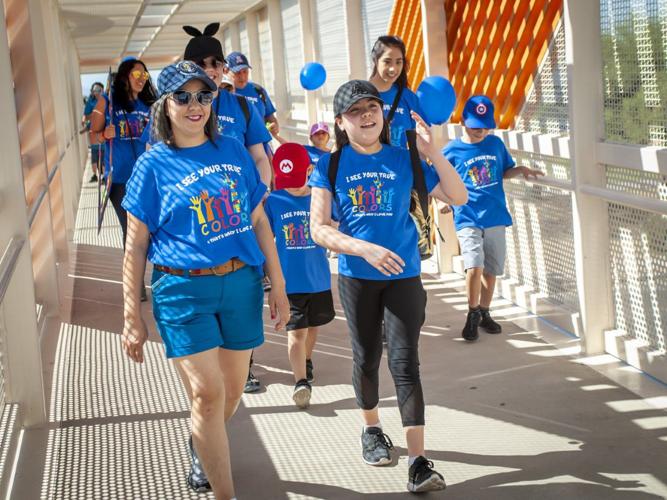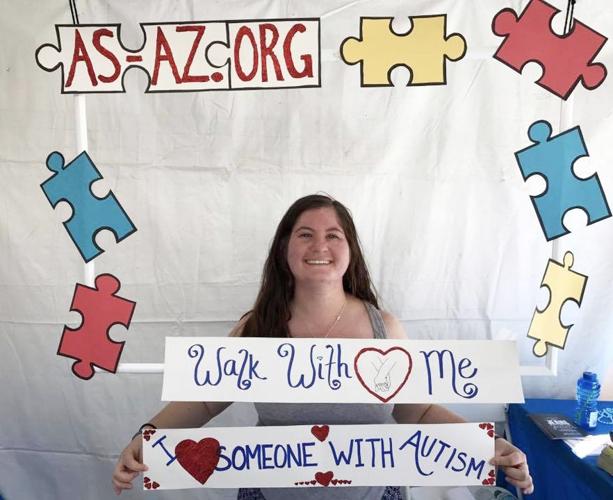Hattie Groskind is just learning to be an adult, but there is one goal she is certain she wants to fulfill when she fully grows up: She hopes to become someone she didn’t have as a child growing up with autism spectrum disorder.
“I want to be a visible role model for kids and young adults who are also on the spectrum. I never had someone closer to my age who was on the spectrum that I was able to look up to and see that, ‘You are going to be OK. Your path may be different, but no matter which way you go or what type of support you need, it doesn’t make you any less of a person,’” said Groskind, 23, a member of the board of directors for the Autism Society of Southern Arizona. She is the first board member to be a self-advocate, or one who openly identifies as living with autism spectrum disorder. As such, she is passionate about bringing a first-person voice to the board of directors by creating an Adult on the Spectrum Advisory Panel to complement existing Family Advisory and Professional Advocacy Panels for the local nonprofit.
A 2018 University of Arizona graduate with a bachelor’s of science in care, health and society, Groskind now works at Social Venture Partners Tucson. She speaks frequently about autism and will assist with registration at the 13th Annual Autism Walk and Resource Fair .
Her personal story is compelling: Groskind was not diagnosed until about age 11, although she said that her family recognized that she was on the autism spectrum when she was a toddler. She attributes the delay to several factors: She is a female, she talks excessively as opposed to too little, and her mother taught her from a young age how to make eye contact.
“I had lots of social issues and didn’t understand how to play with other kids; I had lots of sensory issues — even trying on clothing was really challenging because of how the fabric felt — and any changes in my schedule caused huge problems. ... I just didn’t react like the average kid to daily life,” said Groskind.
Groskind spent years in different therapies and tried different medications; she is now living successfully without medication. She also participated in equine therapy for years to improve her communication skills as well as theater, which she credits for helping her to develop coping skills. She said the study of different characters taught her appropriate vs. inappropriate reactions to different life situations.
“I think it is common for people, no matter what age they are, to learn strategies to help them cope ... and people living with autism are just people living their lives who have a different skill set,” she said.
“You might have friends or co-workers who are on the spectrum and you have no idea: It is their personal choice to disclose or not. Autism is a wide spectrum, and every person’s experience is different and everyone presents differently. Some people actively try to mask symptoms and others don’t, and that is OK. People on the autism spectrum could be all around you and you might have no idea.”
Her statement is backed by facts: According to the Centers for Disease Control and Prevention, autism now affects one in 71 children in Arizona. The complex developmental disability, which typically appears during the first three years of life and affects a person’s ability to communicate and interact with others, has no known cure. It is 3.2 times more likely to be identified among boys than girls. The most recent study found that in spite of the fact that more than 90 percent of the children identified had developmental concerns by age 3, only 34 percent had received a comprehensive developmental evaluation by that age.
The Autism Society of Southern Arizona seeks to change those statistics by assisting with education and outreach and facilitating detection and intervention services for people of all ages, according to associate director Brie Seward.
“We help families navigate autism resources from the beginning stages when they need to talk to doctors and then following diagnosis with a Next Steps Guide that we have developed to aid with treatment options and therapies,” said Seward. “We provide a plan to assist families at every stage, including an adult diagnosis and resource list. Last year we even had our first sensory-friendly job fair for adults, which was a great opportunity for adults with autism to interact with different employers.”
Seward emphasized that although early detection is optimal to maximize a child’s potential, she encourages families to seek out information and assistance through the entire lifespan.
“If you have concerns, talk to your pediatrician or physician and contact us to see where you go for evaluation, whether you are a child or an adult. Families can also get involved in our programs, most of which are free of charge,” Seward said.
The Autism Society offers a variety of diverse programs, including Sonoran Dolphin Swim Club; Sensory Friendly Films; and Science, Technology, Engineering and Art Camps through partnerships with the UA Biomedical Engineering Club and UA Speech, Language and Hearing Sciences.
Other offerings include Playformance Teen Meet-Ups and a peer-led Social Club for adults over age 18 who are on the spectrum; and a Speaker Series for Parents, Professionals and Students that highlights topics such as “Transition from Youth to Adulthood Services,” “Navigating Autism Services” and “Becoming Empowered in the IEP Process.”
The organization also offers an online Tucson Resource List guide created by a committee of developmental pediatricians, psychologists, behavior analysts, nurses, speech therapists, experts in special education and other professionals. And it provides reputable online educational information, a lending library and other workshops and classes.
The upcoming walk provides an excellent opportunity to inform the public about these resources and those around them who live with autism, according to Groskind.
“The walk helps to show that there are so many of us who are out there and we are accessible and we are living real lives,” she said. “It is this amazing space where 1,000 people come together — families and friends and those on the spectrum — and no one thinks you are strange and no one judges you. ... It is a beautiful experience and a community filled with support.”





